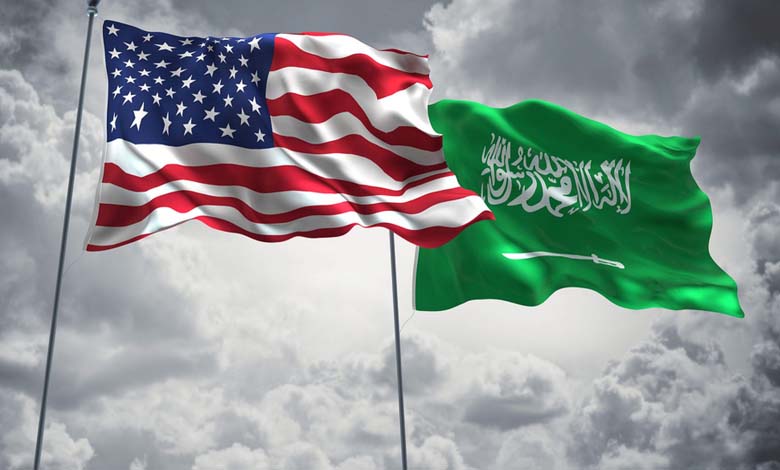Washington is considering lifting the ban on the sale of offensive weapons to Saudi Arabia
Saudi officials have been pressing American legislators and Biden aides for weeks to ease the restrictions on the sale of offensive weapons to the kingdom

The New York Times revealed that the United States has decided to ease restrictions on some arms sales to Saudi Arabia after its engagement in peace talks with the Houthi rebels in Yemen. The military operations led by the Saudi-led coalition against the Houthi group, supported by Iran, were the main reason for imposing these restrictions. However, it seems that this decision is also linked to the recent Houthi attacks on ships in the Red Sea, and the need for Saudi cooperation in deterring them.
The newspaper pointed out that Saudi Arabia is currently “working with the Houthis to solidify a peace agreement, which would formalize the current ceasefire in Yemen.” Saudi officials have been pressuring American legislators and aides to President Joe Biden in recent weeks to ease the restrictions on the sale of offensive weapons to the kingdom, according to US and Saudi officials who spoke to the newspaper and preferred not to disclose their identities due to the confidentiality of the talks.
Riyadh argues that obtaining weapons is important to secure its southern borders in case of future conflict and to ensure the kingdom’s ability to deal with any escalating tensions in the region amid the intensification of the war in Gaza.
These developments come amid Houthi attacks on ships in the Red Sea. The United States has announced the formation of an international alliance to counter Houthi attacks on ships, including the United Kingdom, Bahrain, Canada, France, Italy, the Netherlands, Norway, Seychelles, Spain, and Greece. However, Saudi Arabia stated that it would not participate in this alliance, although the US Department of Defense (Pentagon) indicated that at least eight of the countries that decided to join these efforts refused to publicly disclose their participation, signaling political sensitivities as regional tensions escalate due to the war between Israel and Hamas.
Houthi leaders warned after the announcement of this alliance that “any country” moving against them would have its ships targeted in the Red Sea. This shift in Biden‘s policy is likely to face opposition from some legislators in Congress, according to The New York Times. The Senate Foreign Relations Committee imposed a ban on arms sales to Saudi Arabia in October of last year after the kingdom, in collaboration with Russia and other oil-producing countries, decided to reduce their production.
This Saudi move raised concerns in the United States about Riyadh’s relationship with Moscow amid the invasion of Ukraine. This preceded attempts by committee members to impose restrictions on arms sales to Saudi Arabia due to civilian casualties in the Yemen war.
Democratic Senator and member of the Senate Armed Services Committee Richard Blumenthal said on Thursday, “I will oppose sales of any advanced weapons as a separate deal. I realize the challenges that arose after October 7th, but I believe it is necessary to have a broader context and framework.”
The US newspaper noted that some other legislators have consistently expressed reservations about the step, including Senator Rand Paul, a strong opponent of the war in Yemen, who has long opposed the sale of intelligence and communication-related technologies to Saudi Arabia.
In February 2021, President Biden emphasized that the war in Yemen “must end” and added, “In confirmation of our determination, we end all US support for offensive operations in the war in Yemen, including arms sales.”
Biden also affirmed at that time that Saudi Arabia is an ally of the United States. He said in his speech, “Saudi Arabia faces threats, and we will continue to support it to protect its territory from attacks by groups supported by Iran.”
Biden can reverse this decision if he deems it “not in America’s interest” to approve the flow of weapons to Saudi Arabia, which is the largest buyer of US weapons by a wide margin compared to any other country, according to the newspaper.
However, in recent years, Saudi Arabia has succeeded in bypassing decisions to ban the supply and sale of weapons to it by the United States and Western countries by relying on other sources to provide what it needs in the military sector.
In recent years, Saudi Arabia has worked to diversify its partnerships in purchasing and localizing the arms industry, such as Russia, China, Turkey, and France, through strategic partnerships in the manufacture of fighter jets, drones, helicopters, and tanks.
In 2018, Denmark, Norway, Germany, the Netherlands, Britain, Italy, and the United States all stopped renewing arms export licenses to Saudi Arabia due to the assassination of journalist Jamal Khashoggi and the situation in Yemen. However, many Western countries later reversed the ban, with the latest being the Netherlands in July last year, preceded by Italy in May last year.
Britain also resumed arms sales to Saudi Arabia in July 2020, including Typhoon and Tornado fighter jets and precision-guided bombs.
During the past period, Saudi Arabia has sought new partnerships to develop weapons, especially with Turkey, France, Russia, and China. The latest Saudi efforts to diversify its sources of arms were revealed by Business Insider, which reported that the kingdom’s desire to acquire 200 French fighters reflects its dissatisfaction with what it receives from US weapons.
Before turning to France, Saudi Arabia sought to join the international alliance for the production of sixth-generation aircraft, “Tempest.” The program works on developing an extremely advanced fighter jet and making it available for export in the global market by 2035.












